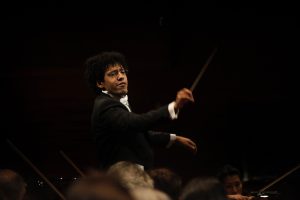The San Diego Symphony Climaxes Its Summer Offerings with Tchaikovsky but no Fireworks
The San Diego Symphony wisely decided that such a presentation of the 1812 Overture during Russia’s current unprovoked military invasion of neighboring Ukraine would be an insult to the valiant Ukrainians fighting to save their country, so the work and the fireworks were cancelled prior to Friday’s Symphony concert, chastely re-titled Tchaikovsky’s Symphonic Tales.
Given the evening’s programing of a pair of Tchaikovsky’s least appealing tone poems, I suggest they should have followed their own lead and played one of his great symphonies. But let’s start with evening’s successes, the familiar “Waltz” and “Polonaise” from Tchaikovsky’s most universally acclaimed opera, Eugene Onegin, and Nikolai Rimsky-Korsakov’s Russian Easter Overture.
Music Director Rafael Payare presided over driven, slightly larger than life accounts of the two bracing dances from the opera, demanding a sonic brilliance from the orchestra that the Rady Shell’s sound system projected with ample power and pristine clarity of detail. In spite of this musical muscle, the ensemble unity within each section proved secure and the overall balance of the sections admirable.
Rimsky-Korsakov’s resplendent Russian Easter Overture captures both the solemnity of Russian Orthodox sacred chant that announces the mystery of Easter and the joyous family festivities that mark the nation’s secular celebration of this spring holiday. Associate Concertmaster Wesley Precourt provided polished, lyrical accounts of the several violin solos that punctuate this buoyant tone poem. His warm timbre provided a welcome contrast to Concertmaster Jeff Thayer’s more austere sound—Thayer and several other first-chair players were absent from this concert. Fortunately Principal Trumpet Christopher Smith and his section propelled the boisterous middle section with stellar, resonant fanfares and flourishes, as did Principal Trombone Kyle R. Covington and his section.
Because The Tempest Fantasy and Francesca da Rimini are highly programmatic, to the casual listener, these works appear to meander incessantly. Several times I was convinced that Tchaikovsky had climaxed his depiction of Francesca da Rimini’s tragic love story, but then he paused and commenced yet another thematic saunter. The horn section confidently flexed its collective muscle in Francesca, and Principal Clarinet Sheryl Renk gave eloquent shape to her extensive solo incantation—which is supposed to represent the poet Dante’s request to visit Francesca and her illicit lover in the underworld. Kudos also to the cello section for offering sultry, languid themes graced with delicate flute descants.
In his early days as composer, Tchaikovsky liked to turn to Shakespeare for inspiration—today his Romeo and Juliet Fantasy-Overture is most frequently programmed—and in 1873 he became enchanted with Shakkespeare’s play The Tempest. Rafael Payare and the orchestra gave a dramatic, well-paced account of The Tempest Fantasy-Overture, Op. 18.
This concert was presented by the San Diego Symphony on Friday, August 26, 2022, at The Rady Shell at Jacobs Park on San Diego Bay.

Ken Herman, a classically trained pianist and organist, has covered music for the San Diego Union, the Los Angeles Times’ San Diego Edition, and for sandiego.com. He has won numerous awards, including first place for Live Performance and Opera Reviews in the 2017, the 2018, and the 2019 Excellence in Journalism Awards competition held by the San Diego Press Club. A Chicago native, he came to San Diego to pursue a graduate degree and stayed.Read more…

